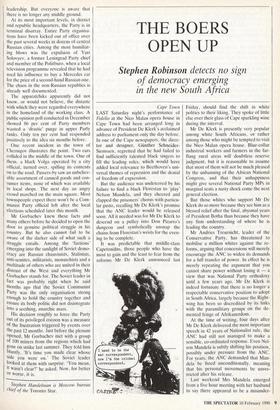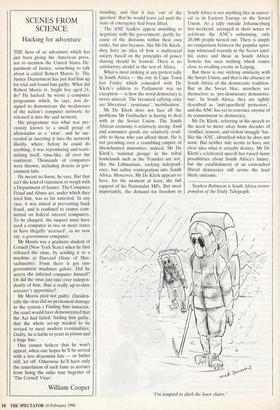THE BOERS OPEN UP
Stephen Robinson detects no sign
of democracy emerging in the new South Africa
Cape Town LAST Saturday night's performance of Fidelio at the Nico Malan opera house in Cape Town had been arranged long in advance of President De Klerk's acclaimed address to parliament only the day before. In one of the Cape newspapers, the direc- tor and designer, Ciiinther Schneider- Siemssen, regretted that he had failed to find sufficiently talented black singers to fill the leading roles, which would have added local relevance to Beethoven's uni- versal themes of repression and the denial of freedom of expression.
But the audience was undeterred by his failure to find a black Florestan to 'play' Nelson Mandela, and they cheered and clapped the prisoners' chorus with particu- lar gusto, recalling Mr De Klerk's promise that the ANC leader would be released soon. All it needed was for Mr De Klerk to descend on a pulley into Don Pizarro's dungeon and symbolically unsnap the chains from Florestan's wrists for the even- ing to be complete.
It was predictable that middle-class Capetonigns, those people who have the most to gain and the least to fear from the reforms Mr De Klerk announced last Friday, should find the shift in white politics to their liking. They spoke of little else over their glass of Cape sparkling wine during the interval.
Mr De Klerk is presently very popular among white South Africans, or rather among those who might be tempted to visit the Nico Malan opera house. Blue-collar industrial workers and farmers in the far- flung rural areas will doubtless reserve judgment, but it is reasonable to assume that most of them will not be much pleased by the unbanning of the African National Congress, and that their unhappiness might give several National Party MPs in marginal seats a nasty shock come the next general election.
But those whites who support Mr De Klerk do so more because they see him as a blessed relief after the final, abysmal years of President Botha than because they have any firm understanding of where he is leading the country.
Mr Andries Treurnicht, leader of the Conservative Party, has threatened to mobilise a million whites against the re- forms, arguing that concessions will merely encourage the ANC to widen its demands for a full transfer of power. In effect he is merely repeating the argument that you cannot share power without losing it — a view that was National Party orthodoxy until a few years ago. Mr De Klerk is indeed fortunate that there is no longer a respectable conservative position to adopt in South Africa, largely because the Right- wing has been so discredited by its links with the paramilitary groups on the de- mented fringe of Afrikanerdom.
At the time of writing, four days after Mr De Klerk delivered the most important speech in 42 years of Nationalist rule, the ANC had still not managed to make a sensible, co-ordinated response. Even Nel- son Mandela is subtly shifting his position, possibly under pressure from the ANC. For years, the ANC demanded that Man- dela be freed unconditionally, meaning that his personal movements be unres- tricted after his release.
Last weekend Mrs Mandela emerged from a five hour meeting with her husband to say there appeared to be a misunder- standing, and that it was 'out of the question' that he would leave jail until the state of emergency had been lifted.
The ANC leaders appear unwilling to negotiate with the government, partly be- cause of the divisions within their own ranks, but also because, like Mr De Klerk, they have no idea of how a multiracial society based on the principles of power sharing should be framed. There is no satisfactory model in the rest of Africa.
What is most striking at any protest rally in South Africa — the one in Cape Town last Friday which coincided with De Klerk's address to Parliament was no exception — is how the word democracy is never uttered. The favoured rallying cries are 'liberation', 'resistance', 'mobilisation'.
Mr De Klerk does not face all the problems Mr Gorbachev is having to deal with in the Soviet Union. The South African economy is relatively strong; food and consumer goods are relatively avail- able to those who can afford them. He is not presiding over a crumbling empire of disenchanted minorities: indeed, Mr De Klerk's 'national groups' in the :tribal homelands such as the Transkei are not, like the Lithuanians, seeking independ- ence, but rather reintegration into South Africa. Moreover, Mr De Klerk appears to have, for the moment at least, the full support of his Nationalist MPs. But most importantly, the demand for freedom in
South Africa is not anything like as univer- sal as in Eastern Europe or the Soviet Union. At a rally outside Johannesburg last weekend, arranged at short notice to celebrate the ANC's unbanning, only 20,000 people turned out. There is simply no comparison between the popular upris- ings witnessed recently in the Soviet satel- lite states and those in South Africa. Soweto has seen nothing which comes close to rivalling events in Leipzig.
But there is one striking similarity with the Soviet Union, and that is the absence in South Africa of the democratic tradition. But in the Soviet bloc, marchers see themselves as 'pro-democracy demonstra- tors'. In South Africa, they are rightly described as 'anti-apartheid protestors', and the ANC has yet to convince anyone of its commitment to democracy.
Mr De Klerk, referring in his speech to the need to move away from decades of 'conflict, tension, and violent struggle' has. like the ANC, identified what he does not Want. But neither side seems to have any clear idea what it actually desires. Mr De Klerk's celebrated speech has raised many possibilities about South Africa's future, but the establishment of an entrenched liberal democracy still seems the least likely Outcome.
Stephen Robinson is South Africa corres- pondent of the Daily Telegraph.
`I'm tempted tempted to ditch the lawn chairs.'



















































 Previous page
Previous page